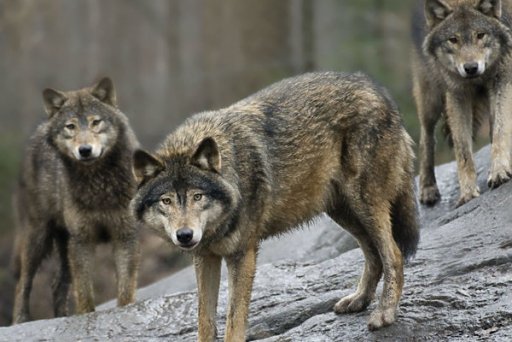
Benefactor
We all enjoy getting out in to nature, and having adventures. When we are pursuing our adventures, it is important to remember we are guests, visiting these wild places. I hope to share some time proven strategies to increase your safety, when you have rare encounters with potentially dangerous animals.
A good policy, when in wild places, is not to surprise the animals. Let them know you are in the area. Travel in groups, the larger the better. It is OK to talk, laugh, or even sing loudly. Be observant, plug in to your environment, not to your iPod.
Wolves

Wolves are highly social animals and live in packs. Worldwide, pack size will depend on the size and abundance of prey. In North America average pack size is 10 individuals. The pack is a complex social family, with older members (often the alpha male and alpha female) and subordinates, each having individual personality traits and roles within the pack. Packs defend their territory from other, invading packs by howling and scent marking with urine.
Wolves are not normally a danger to humans. Wolf attacks on humans are rare, but have occurred. Like Bears, wolves can quickly learn to associate campgrounds, picnic areas, and roads with food. Humans habituate them by providing them with food This leads to aggressive behavior toward humans.
• DON"T RUN! This triggers the natural hunting instinct of the wolf
• Don't "stare the animal down."
• Don't turn your back on the wolves.
• Make yourself appear scary: shout, throw stones, raise your arms over your head.
• Don't look scared or fall, this will encourage an attack.
The use of bear pepper spray can be an affective deterrent to a Wolf attack.
A good policy, when in wild places, is not to surprise the animals. Let them know you are in the area. Travel in groups, the larger the better. It is OK to talk, laugh, or even sing loudly. Be observant, plug in to your environment, not to your iPod.
Wolves

Wolves are highly social animals and live in packs. Worldwide, pack size will depend on the size and abundance of prey. In North America average pack size is 10 individuals. The pack is a complex social family, with older members (often the alpha male and alpha female) and subordinates, each having individual personality traits and roles within the pack. Packs defend their territory from other, invading packs by howling and scent marking with urine.
Wolves are not normally a danger to humans. Wolf attacks on humans are rare, but have occurred. Like Bears, wolves can quickly learn to associate campgrounds, picnic areas, and roads with food. Humans habituate them by providing them with food This leads to aggressive behavior toward humans.
- Never feed a wolf or any other wildlife. Do not leave food or garbage outside unattended. Make sure the door is shut on a garbage can or dumpster after you deposit a bag of trash.
- Treat wolves with the same respect you give any other wild animal. If you see a wolf, do not approach it.
- Never leave small children unattended.
- If you have a dog, keep it leashed.
• DON"T RUN! This triggers the natural hunting instinct of the wolf
• Don't "stare the animal down."
• Don't turn your back on the wolves.
• Make yourself appear scary: shout, throw stones, raise your arms over your head.
• Don't look scared or fall, this will encourage an attack.
The use of bear pepper spray can be an affective deterrent to a Wolf attack.
Last edited by a moderator:







